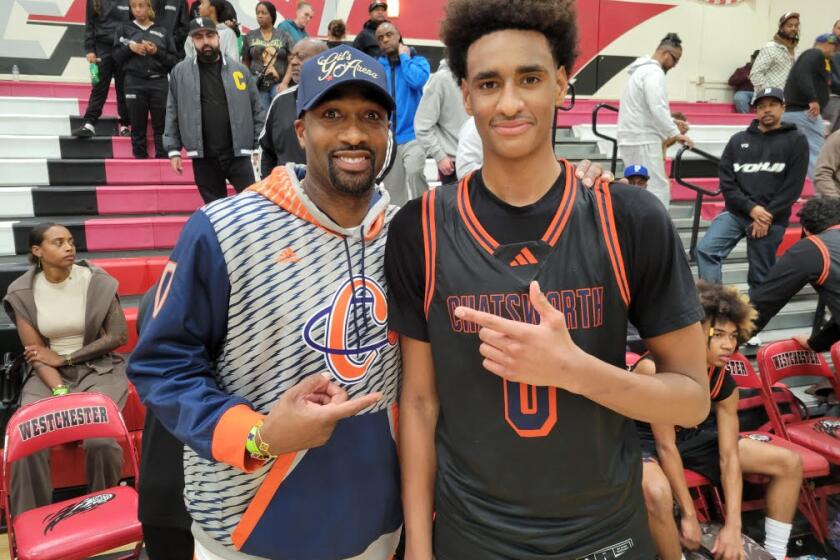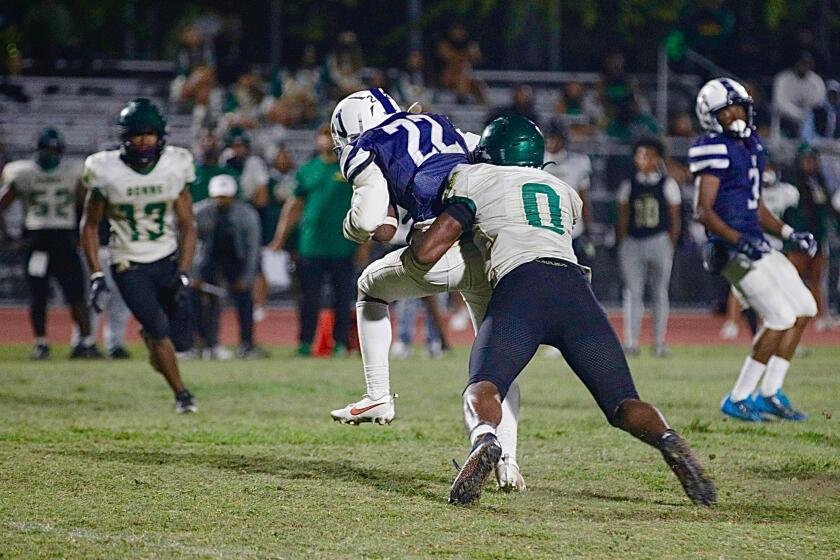A fatherâs tough love mixed with a sonâs talent puts boxer Carlos Balderas in the Olympics
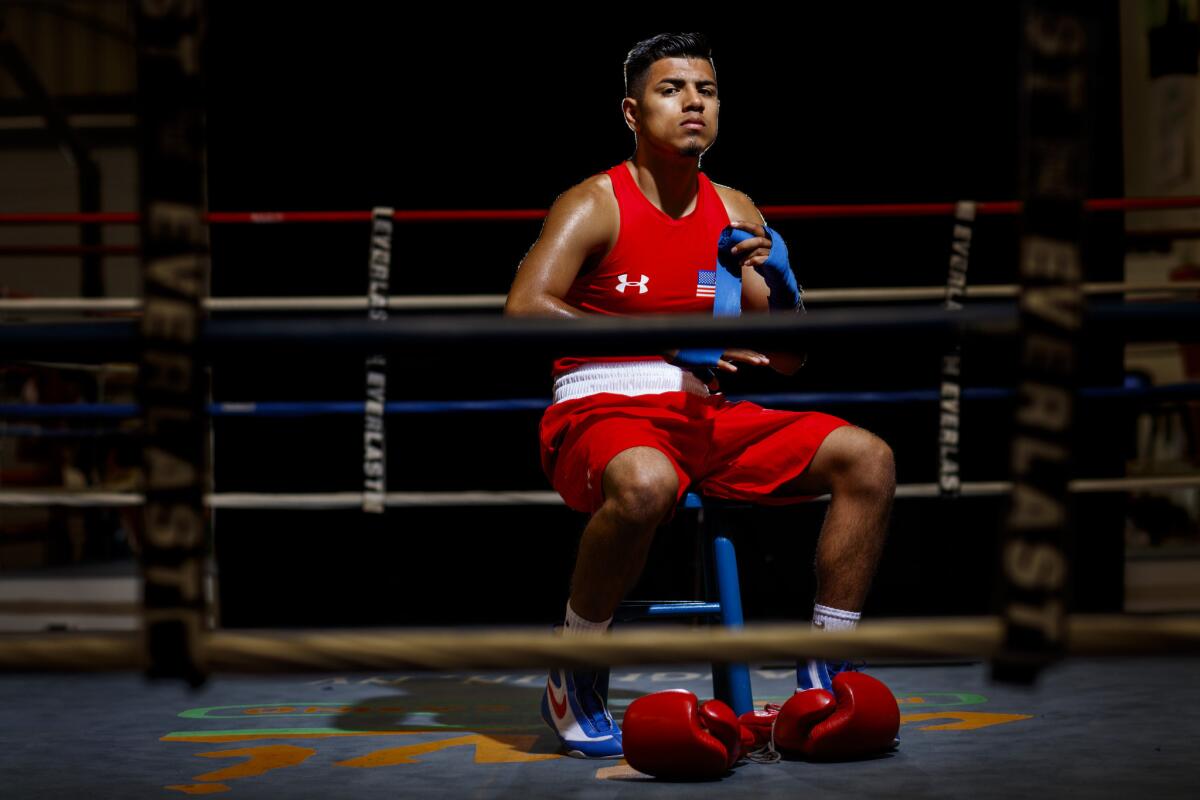
Reporting from SANTA MARIA, Calif. â The boxer dances across an empty ring, moving to a beat only he can hear. His punches snap with a grace honed by years of hard work.
All the times he rose early as a boy, running cold streets while classmates watched from a passing school bus, made him quick. All the times he trudged across town, lugging a duffel bag full of gear, made him strong.
Carlos Balderas remembers wanting to skip workouts.
âGrowing up, I had friends and they always hung out,â he says. âMy dad made me go to the gym.â
His father watches from outside the ring and recalls how a skinny kid grew into a powerful 19-year-old lightweight who will box at the Olympic Games this summer. Zenon Balderas insists it took a stern hand to bring out the best in Carlos.
Yet there is doubt in his voice.
âWas I too tough?â he wonders. âSometimes I feel bad.â
This converted warehouse in Santa Maria buzzes with young fighters skipping rope and pounding the heavy bags. Carlos â his arms glistening with sweat â has the ring to himself.
When I was younger, I’d get in trouble for fighting. Now I get rewarded for it.
— Carlos Balderas
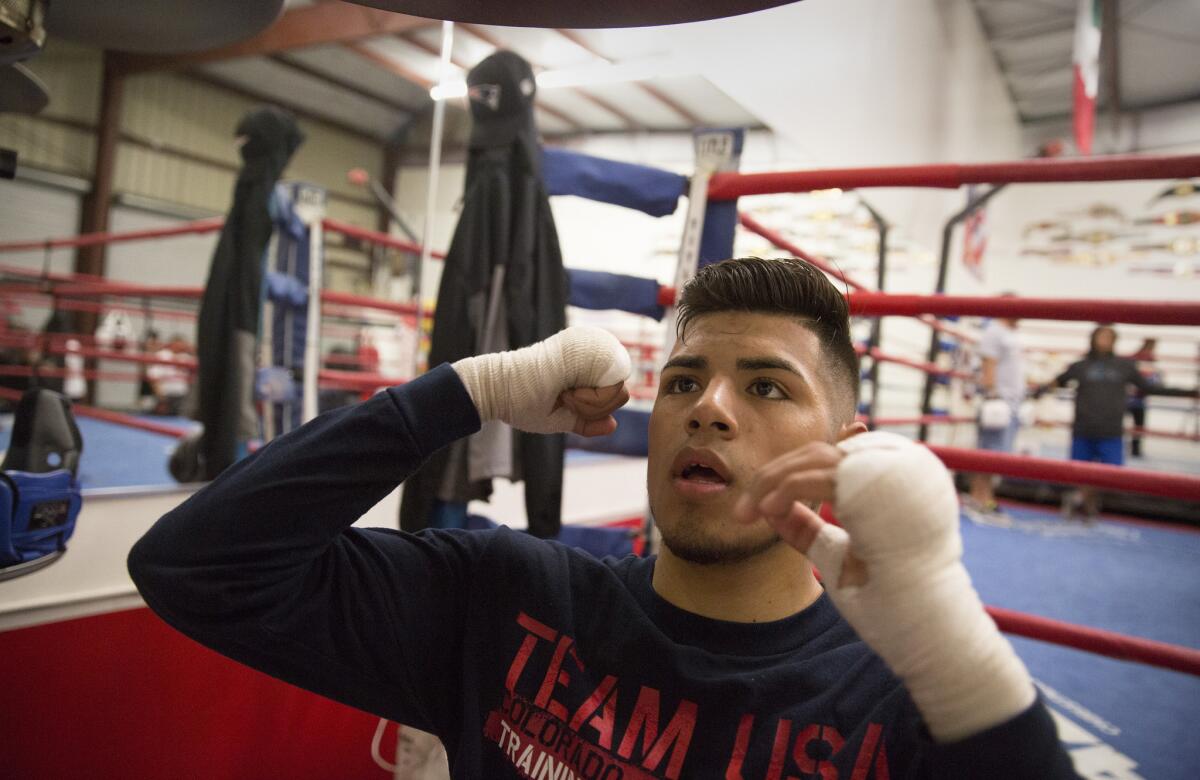
Tears well in his fatherâs eyes.
Zenon says he pushed his son hard for a reason. He talks about a family that made its way up from Mexico to work the strawberry fields of Southern California. He talks about surviving.
::
The grandfather does not speak English; he smiles and waves at visitors who have come to his home on the outskirts of town.
David Balderas, his back bent at 88, his hair gone white, finally quit working the fields a few years ago at his familyâs insistence.
The promise of steady wages drew him north from Oaxaca in the 1950s. He settled here for good in the â80s, saving to bring his wife and eight children across the border. When the kids arrived in Santa Maria, Balderas would not enroll them in public school. He pointed to a family down the hall.
If you go to school, he explained, youâll end up cholos like them.
His second-youngest son, also named David, says: âI didnât know what cholos were. I thought they were kids who studied together.â
The Balderas children helped in the fields for a year, developing a work ethic and receiving green cards through a 1986 immigration reform act. Only then were they allowed to attend classes.

Reporter Lindsey Thiry talks with 19-year-old Carlos Balderas about his road from his humble beginings in Santa Maria, Calif., to joining the U.S. Olympic boxing team in Rio.
Margarito now works at a winery and Faustina is a housewife. Norma became an attorney while Emiliano took over as pastor of a local church.
The younger David struggled in school, but he earned good enough grades to attend UC Santa Barbara, where he studied math. He now teaches algebra at Santa Maria High.
The baby of the family, Zenon had it even rougher, fighting as a kid and marrying early. He was 16 when his first son, Jose, was born. Carlos came along a year later.
His wife left with the boys when they were toddlers. Carlos recalls she often dumped them with relatives.
âWe were down in L.A.â he says. âGoing house to house.â
::
The Balderas home was overflowing with a dozen or so bodies squeezed into two bedrooms. Still, Emiliano drove to the city, found his nephews and hauled them back.
âEverybody slept on the floor,â Carlos says. âOne blanket each.â
Reunited with his sons, Zenon tried to be a good father but it wasnât easy. Jose and Carlos acted up in school, jumping from their seats and constantly fighting. Their dad and grandfather punished them.
âIt got to the point where they were hitting me before school,â Carlos says. âTheyâd say, âIâm hitting you because I know youâre going to get in trouble again today.ââ
His grandfather took him out to the fields for a taste of manual labor. Carlos, still in elementary school, had to carry heavy boxes to a truck where the boss punched his ticket.
This hard lesson did not stick. As Carlos and Jose continued fighting â âWe were always so hyper,â Jose says â the family tried something different: Boxing.
If you don’t go to school, if you keep getting in trouble, you end up working in the fields or one of those stores. Or you end up in a gang.
— David Balderas, uncle of Carlos
The owner of a local gym took one look at the brothers, who were 7 and 8, and told them to come back in a few years. But they noticed another boy their age working out.
âThatâs my grandson,â Zenon recalls the owner saying. âHeâs been training for more than a year.â
Zenon proposed a deal: If Carlos defeated the grandson in a bout, his kids got to stay. Jose recalls: âMy brother beat him up. Made him cry.â
::
Picnics, birthday parties, barbecues after church â it seemed that wherever the Balderas family gathered, someone broke out the gloves.
âWe loved to box,â Zenon says. âEven if we were tired from the fields.â
They knew it was a dangerous sport, that kids could get hurt in the ring, but Zenon became convinced it would help his sons. That is why he made them train every day. That is why he gave them whuppings when they skipped workouts.
âI told myself I needed to do something,â he says. âI didnât want them to be the same as me when I was young.â
With no one to give them a ride â and no bus money â the brothers carried those duffel bags a mile each way, looping the strap over one shoulder, then the other and finally across their heads.
The family eventually left the gym over an argument. Zenon wanted the boys fighting every month but the owner thought them too young for so much action. Zenon finagled a key to a gym 30 miles south in Lompoc.
For the next four years, he trained them every night. When the drive grew too wearisome, he and his brother David cobbled together rent for the warehouse, opened their own gym and invited other kids.
âLook around Santa Maria â all you see are strawberry fields and convenience stores,â David says. âIf you donât go to school, if you keep getting in trouble, you end up working in the fields or one of those stores. Or you end up in a gang.â
If Carlos sometimes bristled at training, there was no doubt about his love for the sport. He began carrying around gloves, challenging classmates and neighborhood kids.
âLittle by little,â he says, âthey didnât want to spar with me anymore.â
::
Home movies show the 7-year-old standing flat-footed in the ring, his oversized shorts making him look puny as he trades shots with an opponent.
âOur styles werenât so good,â Carlos says.
Quickness and energy carried him at first, until he began learning the nuances of the game. Soon after becoming eligible for official competition at 8, he won his first tournament â defeating his brother in the final â and started fighting up and down the coast.
âI was nervous,â he says. âA lot of people donât ever get to leave Santa Maria.â
Money was a challenge â the grandfather once had to hock his watch to put food on the table â but the family found a way to get the brothers to competitions.
Carlos traveled to Alabama for the 2011 Junior Olympic national championships at 15. A gold medal at the PAL championships in Ohio the next year propelled him to bigger victories and a spot on U.S. teams that competed internationally.
âCarlos was one of those kids always in the finals, always fighting tough opponents,â says Kay Koroma, a resident coach for USA Boxing. âYou knew this kid was going to be somebody.â
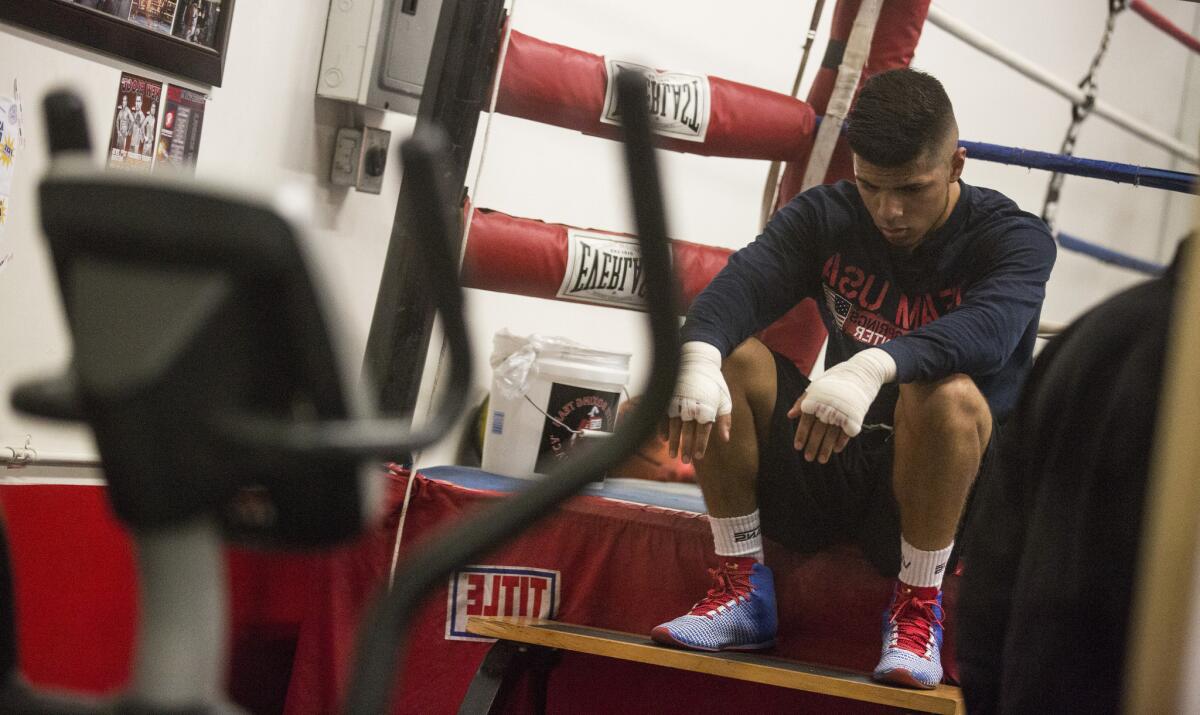
Videotape of a recent bout against a Moroccan fighter shows him moving effortlessly, changing angles, flicking a jab before ducking to fake a body shot. When the other guy covers low, Carlos comes over the top with a knockout punch.
âI like to make my opponents look clumsy,â he says.
Last year, he won four of five bouts on the amateur World Series of Boxing circuit, losing only when he was accidentally head-butted by the top-ranked fighter from Azerbaijan.
Shortly after Thanksgiving, USA Boxing called to inform him that he had accumulated enough points to qualify for Rio, no need to win the trials. His dad cried.
::
Was the father too tough on his son?
Carlos shrugs and says boxing kept him in high school so he could earn a diploma. It allowed him to travel the world and â after Rio â figures to make him good money when he turns professional with his brother.
âWhen I was younger, Iâd get in trouble for fighting,â he says. âNow I get rewarded for it.â
After all these years, the father still has his doubts but answers the question with one thought.
âAt the end of the day, Carlos is an Olympian,â Zenon says. âSo something good came of it.â
The day after a sparring session with pro champion Leo Santa Cruz â the family pitched in gas money for the drive to Los Angeles â they keep the workout short.
Strapping a thick pad across his midsection and slipping boxing mitts over each hand, Zenon climbs into the ring. He whispers encouragement as Carlos throws punches, exhaling sharply with each combination.
They move around the ring in unison, from one corner to the next, in a waltz they have done together so often. After about 10 minutes, the son lands one more shot and the father quietly backs away.
More to Read
Go beyond the scoreboard
Get the latest on L.A.'s teams in the daily Sports Report newsletter.
You may occasionally receive promotional content from the Los Angeles Times.









